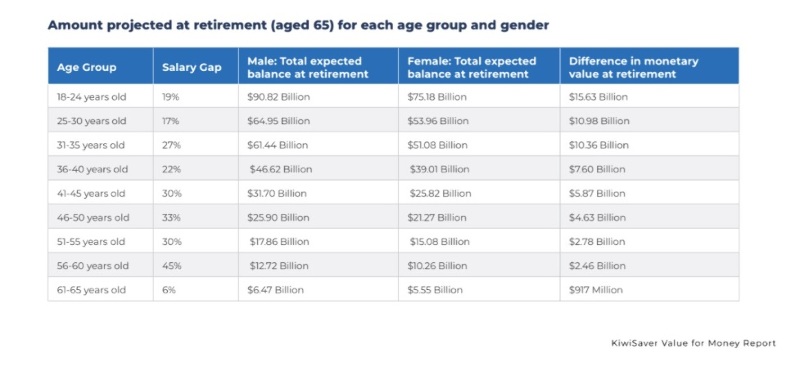National Capital: Women should back themselves on investment
Women can narrow the $61 billion KiwiSaver retirement gap through playing to their investment strengths, says financial advice firm National Capital.
Tuesday, May 21st 2024, 6:31AM  2 Comments
2 Comments
by Andrea Malcolm

In its fifth quarterly report on KiwiSaver, National Capital says women, on average earn 25% less salary than men. This, combined with a less growth-oriented investment strategy favoured by women, means the KiwiSaver gender gap at retirement could reach as much as $61b.
While major systemic change is needed to close the wage gap, focusing on investments that aim for higher growth would give women more money at retirement, says the report.
It cites analysis by US fund manager Fidelity, that showed over a 10-year period, women out performed men by 40 basis points. However they also under rated their ability as investors compared to men.
A range of studies in the recent past have shown women achieve better investment results than men. In 2022, Wells Fargo found that women only take around 82% of the risk men take, yet still earn higher risk-adjusted returns over time.
Women are less prone to jump funds in times of volatility. US insurance and financial services company Nationwide research found that in times of volatility, only 8% of women pulled money from their retirement accounts, compared to 15% of men. Meanwhile a study by the University of California, Berkeley found that women trade less with men trading 45% more often resulting in a 2.65% reduction in returns compared to a 1.72% reduction for women.
These are all strengths that women should use, says Fernandes. “We’re saying women should trust in their ability more.”

National Capital looked at the average female New Zealander within the cohort aged 41-45, with an average 30% salary gap.
This translates to a comparative advantage of approximately $50,000 in KiwiSaver funds for men within the same age bracket at age 65.
This assumes a 33% tax rate, and is a long term expected return for various risk profiles ranging from 2.36% per annum for conservative to 7.10% for very aggressive, 2% inflation, 2% salary growth and 1% KiwiSaver fees.
Analyst Ravi Chandola says, comparing the differential of a 40-year old woman investing in an aggressive versus conservative category fund, she would be better off by $60,000.
On its overall rating of KiwiSaver funds, little has changed since its report for December quarter 2023.
National Capital assesses diversified KiwiSaver funds’ value for money on six criteria each adding up to 100: performance after fees (25 points), value for fees (15 points), fund management capability (20 points), provider stability (10 points), portfolio composition and processes (20 points), and ethical investing (10 points).
On performance, average one year returns to the March 2024 quarter ranged from 7.21% for conservative funds to 19.87% for high growth funds. All funds yielded positive one year returns to the March 2024 quarter. The highest one year performance was Generate’s KiwiSaver focused growth fund at 25.44%, while the lowest was OneAnswer KiwiSaver’s conservative fund, returning 5.88%.

On fees, Simplicity maintained its position of lowest fee provider across growth, balanced and conservative categories. The average fees varied across categories; high growth had the highest average fees of 1.12%, while conservative had the lowest at 0.61%.
While a growing number of providers have been phasing out fixed monthly membership fees, 12 of the 24 providers researched still included membership fees in their product disclosure statements.
On ethical investing Booster KiwiSaver’s Socially Responsible funds scored the highest across high growth, growth and balanced funds. Simplicity’s conservative fund scored the highest in the conservative category with a rating of 8.23 out of 10.
Overall, the managers maintained how they invest ethically with an unchanged average of 6.11 from last quarter. This score indicates having some exclusions, so overall managers seem to be paying attention to ethical investment, the report says. Other high scorers include Fisher Funds TWO, Fisher Funds KiwiSaver plan, Nikko AM, Pathfinder, MAS and Simplicity.
Superlife’s passive funds varied widely on ethical ratings, securing second rank in the balanced category with 8.7 out of 10 but 2.15, 2.44 and 1.97 respectively for the high growth, growth and balanced funds.
| « Aurora KiwiSaver targets private assets that support business growth | No shift on KiwiSaver balance gender gap » |
Special Offers
Comments from our readers
I am not sure what to do with the information and again, why doesn't someone clearly define exactly the reason for these constantly quoted pay gaps. Is it more woman than men are still having babies? What about the other 2 genders, what's happening with them?
I have never seen a job advertised where it has the pay scale for a man being higher than a women. I can not even imagine an employer doing that and or any women accepting this situation.
More real work needs to be done on this as it is just trotted out like a fact and like women are being down trodden.
Sign In to add your comment
| Printable version | Email to a friend |



Looking at this report and playing the devil's advocate, I really don't find this information particularly helpful. It identifies that, like many, women on average earn 25% less than men. A very general statement without merit in many cases or a solution. I recently read an overseas publication that believed female CEO's were paid more than their male counterparts in New Zealand. Then there is the pay gap between an intern and a CEO—outrageous!
The report quotes several surveys identifying women with a "less growth-oriented investment strategy," while at the same time saying they tend to be better investors than men. Why then, would a male analyst suggest women invest in a higher level of growth assets? They seem to be doing quite well on their own, Ravi. You have just told us so.
Then there is the definition of a woman in the first place. I have contacted the Labour Party's leader for guidance but have yet to hear back.